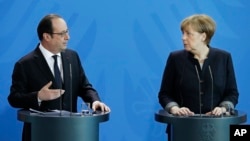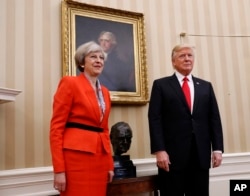The European Union’s two most influential leaders called for unity in championing European values and the European project during a Berlin meeting overshadowed by concerns about the new Trump administration and rising populism at home.
“We need a clear, common commitment to the European Union, to what we have accomplished and to the values of our liberal, democratic democracies,” German Chancellor Angela Merkel said in a brief statement to the press alongside French President Francois Hollande.
Coming a week before the EU’s first summit of the year in Malta, the meeting aimed to set the tone for the 27-member bloc. Yet it was overshadowed by another key meeting across the Atlantic, as Prime Minister Teresa May of exiting EU member Britain talked with U.S. President Donald Trump.
In remarks, Trump has suggested a sharp break with the EU on issues ranging from maintaining sanctions on Russia and upholding the Iran nuclear agreement to climate change, free trade and NATO’s viability.
Trump’s support of Brexit, and recent predictions of the demise of the euro currency by Ted Malloch - reported to be the likely next U.S. ambassador to the EU - have not helped matters.
Describing the new U.S. administration Friday as posing “challenges,” Hollande said it was important to speak to Trump “with a European point of view and promote our interests and values.”
“They are very much concerned that the new President Trump will try to split the Europeans on some key policy issues,” said Daniel Gros, director of the Brussels-based Center for European Policy Studies. “I think it’s extremely important for Merkel to have a unified European response to anything the Americans might undertake - and that can only start with a Franco-German agreement.”
Internal threats
The two leaders also warned of internal threats to Europe, with the rise of populist anti-EU parties across the region. Both their countries face key elections this year, with the upcoming presidential and legislative vote in France particularly closely watched.
President Hollande, who has taken a tough line against Syria and Moscow, is not running for re-election, judged too unpopular to win.
By contrast, two of the top candidates to replace him - conservative former prime minister Francois Fillon and far-right contender Marine Le Pen - want to end sanctions against Russia and work with Damascus in fighting the Islamic State group, positions that may align them closer to Washington if either becomes leader, than to Brussels.
Speaking after his own meeting with Merkel on Monday, Fillon said sanctions against Moscow were ineffective, and “we must find another way to talk.”
For her part, Le Pen is a strong supporter of Trump, seeing his unexpected victory last November as a harbinger of her own. During a meeting with other far-right European parties in Germany last week, she called on European voters to “wake up” and follow the example of their British and American counterparts.
Still, analyst Gros believes that, on the whole, the U.S. president is proving a galvanizing force, bringing the EU - which is sharply divided over issues like immigration - closer in opposition.
“There is a sense of ‘all united’ in a European view of the world, which is different in its view than that of Trump,” he said. “It’s a long-term partnership based on common values.”
Closer EU defense and security cooperation seems to be the first target, in the wake of new doubts over the U.S. commitment to NATO. The first lines were traced during an end-of-year summit last December and Merkel has been pushing since.
“The more Trump insists, the more he tries to divide the Europeans, the stronger will be the call for stronger military capacity,” Gros said. “It’s actually in the making. But it’s nothing that you decide in a week or two. It will take years.”
Still Friday’s meeting between Trump and Britain’s Theresa May - his first with a foreign leader since taking office - offers an unsettling counterpoint.
“It will be a strategic choice for May, whether to cozy up with Trump,” Gros said. “She will have to weigh the U.K.’s long-term interests, since we never know if Trump will stick to a particular policy and how long he might last himself.”
The upcoming Brexit negotiations will also give the EU some bargaining power, he believes, as Britain looks to access the bloc's single market after leaving.
“If she breaks ranks with Europe on some high policy issues,” Gros said, “then the trade deal available to her will be a lot less favorable.”











